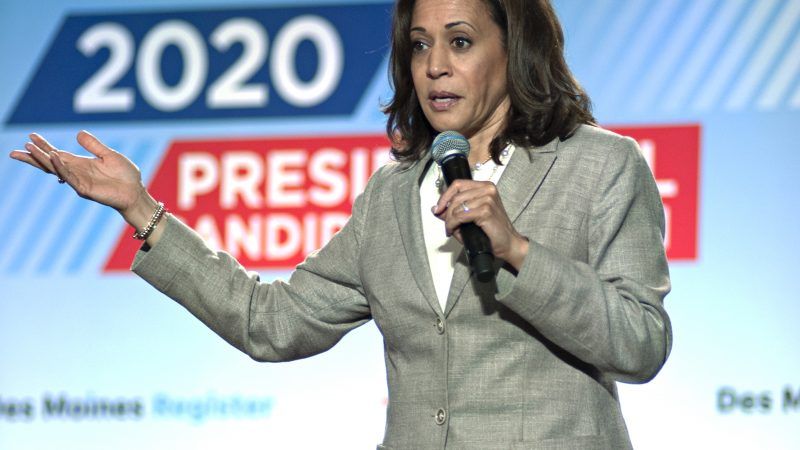Kamala Harris' New Student Debt Provision Would Help Approximately No One
Her proposal is supposed to chip away at the "opportunity gap."

Over the weekend, Sen. Kamala Harris (D–Calif.) unveiled a plan for "reducing the opportunity gap" between African Americans and the remainder of the country. It included several provisions, but one part in particular drew the most attention: She promised to "establish a student loan debt forgiveness program for Pell grant recipients who start a business that operates for three years in disadvantaged communities." Beneficiaries could receive up to $20,000 in debt forgiveness and could defer debt without interest during a "business-formation period" of three years or less.
What?
The provision is so ridiculously specific that it's hard to tell who exactly would benefit from it at all. Students who qualify for Pell grants hail from low-income households: They likely have little capital to begin with, which would certainly impede a successful small business. Harris says she'll also establish a $12 billion fund to assist minority small business owners, but that $12 billion will likely be for naught—at least when it comes to fulfilling Harris' requirements for help with student debt. About 80 percent of small businesses fail within the first year and a half, and even fewer make it to Harris' three-year minimum. And her plan is supposed to be for businesses operating in disadvantaged communities. They face a much tougher entrepreneurial landscape and a subsequent decreased chance of success.
Other elements of Harris' plan include a $60 billion investment in STEM education at historically black colleges and universities (HBCUs). The proposal in total costs $84.5 billion, with additional capital set aside for a $10 billion investment in the State Small Business Credit Initiative and another $2.5 billion "to support HBCU programs that will generate Black teachers." How she plans to pay for it is unclear, but an aide has intimated that she will close tax loopholes and raise levies on the wealthy and Wall Street.
Harris' plan comes amidst a slew of other confusing policy statements. On a number of occasions, the senator has flip-flopped on whether or not she wants to eliminate private health insurance. And during a recent appearance on The View, she initially told the panel that she did not support decriminalizing illegal border crossings—a backtrack from her debate performance—only to immediately reverse course in the same sentence.
"I'm not in favor of decriminalizing or not having consequence for, let me be very clear, we have to have a secure border, but I am in favor of saying that we're not going to treat people who are undocumented cross the border as criminals, that is correct, that is correct," Harris said.
In that vein, her opportunity gap proposal is the latest in a string of would-be policies mired in doubt and disarray, perhaps because Harris herself doesn't quite know yet where she falls. The senator is trying to pull off a high-flying balancing act, one where she tries to appeal to everyone by standing for everything. The end result looks more like standing for nothing.
Editor's Note: As of February 29, 2024, commenting privileges on reason.com posts are limited to Reason Plus subscribers. Past commenters are grandfathered in for a temporary period. Subscribe here to preserve your ability to comment. Your Reason Plus subscription also gives you an ad-free version of reason.com, along with full access to the digital edition and archives of Reason magazine. We request that comments be civil and on-topic. We do not moderate or assume any responsibility for comments, which are owned by the readers who post them. Comments do not represent the views of reason.com or Reason Foundation. We reserve the right to delete any comment and ban commenters for any reason at any time. Comments may only be edited within 5 minutes of posting. Report abuses.
Please to post comments


Sounds like discrimination in favor of a particular segment of the population. Isn't discrimination supposed to be bad?
The provision is so ridiculously specific that it's hard to tell who exactly would benefit from it at all.
She has someone in mind.
Probably her campaign offices. Why else would she choose a time span less than the interval between campaigns?
"""I'm not in favor of decriminalizing or not having consequence for, let me be very clear, we have to have a secure border, but I am in favor of saying that we're not going to treat people who are undocumented cross the border as criminals, that is correct, that is correct," Harris said.""
To be fair, she says she's in favor of SAYING that we're not going to treat them like criminals. What she plans to DO could be a different story.
nice catch. She is a lawyer after all.
I'm not understanding why Harris wouldn't instead be advocating that students at "historically black colleges" be bused to majority white colleges? How are colored people supposed to learn unless there is a white face to the right and left of them?
This is baffling to me, so if someone can draw this out in crayon for me - much obliged.
"student loan debt forgiveness program for Pell grant recipients"
Pell grants don't have to be paid back. They're grants. So, please: what is the connective tissue between these grant recipients and those who accrue student debt? Is it simply a way to meter access to her program?
If you have a Pell grant and a loan, they'll forgive the loan.
So her plan is specifically racist?
It’s racist to point that out.
Looks more like a failed Kamala Harris' PR campaign to me. It would be best if she did something to prevent contract cheating. I'm a teacher and I must say that this is a major problem that we must address. There are a lot of threads on Reddit where young students are looking for someone to do their work for them.